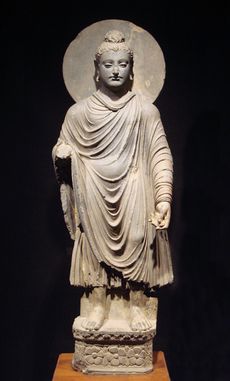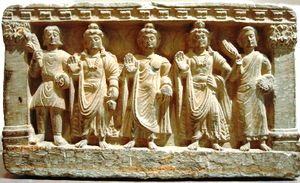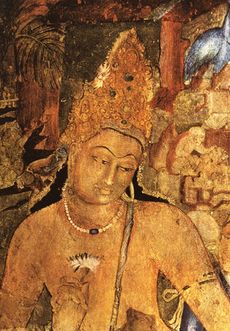مهايانا
| |||||||||
| |||||||||
مهايانا (Mahayana) (بالسنسكريتية: المركبة الكبرى) أحد المذهبين الرئيسيين للبوذية. ينتشر غالبا في دول شرق آسيا مثل الصين وكوريا واليابان ومنغوليا وفيتنام وأقطار الهمالايا مثل التبت والنيبال وبوتان. يهدف إلى خلاص جميع الكائنات الحاسة. يتميز بالتعقيد وبالتوحيد والتأكيد على روح الجماعة. سمي بالعربة الكبرى لأنه يساعد عددا أكبر من الكائنات الحية.
التاريخ

الأصول
The Chinese monk Yijing who visited India in the 7th century CE, distinguishes Mahāyāna from Hīnayāna as follows:[1]
Both adopt one and the same Vinaya, and they have in common the prohibitions of the five offences, and also the practice of the Four Noble Truths. Those who venerate the bodhisattvas and read the Mahayana sūtras are called the Mahāyānists, while those who do not perform these are called the Hīnayānists.
Earliest Mahayana sutras

Earliest inscriptions
Doctrine
بوذيساتڤا
Scriptures

Āgamas
انظر أيضاً
|
|
Notes
References
- ^ Williams, Paul (2008) Mahāyāna Buddhism: The Doctrinal Foundations: p. 5
Sources
- "Mahayana". Encyclopædia Britannica. Encyclopædia Britannica. 2002.
للاستزادة
- Beal (1871). Catena of Buddhist Scriptures from the Chinese, London, Trübner
- Lowenstein, Tom (1996). The Vision of the Buddha, Boston: Little Brown, ISBN 1-903296-91-9
- Schopen, G. "The inscription on the Kusan image of Amitabha and the character of the early Mahayana in India", Journal of the International Association of Buddhist Studies 10, 1990
- Suzuki, D. T. (1914). "The Development of Mahayana Buddhism", The Monist Volume 24, Issue 4, 1914-10-01, p565-581
- Suzuki, D. T. (1908). Outline of Mahayana Buddhism, Open Court, Chicago
- Walser, Joseph (2007). The origin of the Term Mahayana and its relationship to the Agamas, Journal of the International Association of Buddhist Studies 30 (1-2), 219-252
- Williams, Paul (1989). Mahayana Buddhism, Routledge.
- Karel Werner; Jeffrey Samuels; Bhikkhu Bodhi; Peter Skilling, Bhikkhu Anālayo, David McMahan (2013). The Bodhisattva Ideal: Essays on the Emergence of Mahayana. Buddhist Publication Society. ISBN 978-955-24-0396-5.
{{cite book}}: CS1 maint: multiple names: authors list (link)
وصلات خارجية
- Digital Dictionary of Buddhism
- Comparison of Buddhist Traditions (Mahayana - Therevada - Tibetan)
- The Mahayana Mahaparinirvana Sutra: complete text and analysis.
- Buddhas and Bodhisattvas in Mahayana Buddhism
- Arahants, Buddhas and Bodhisattvas by Bhikkhu Bodhi
- The Bodhisattva Ideal in Theravāda Theory and Practice by Jeffrey Samuels
خطأ لوا في وحدة:Authority_control على السطر 278: attempt to call field '_showMessage' (a nil value).






